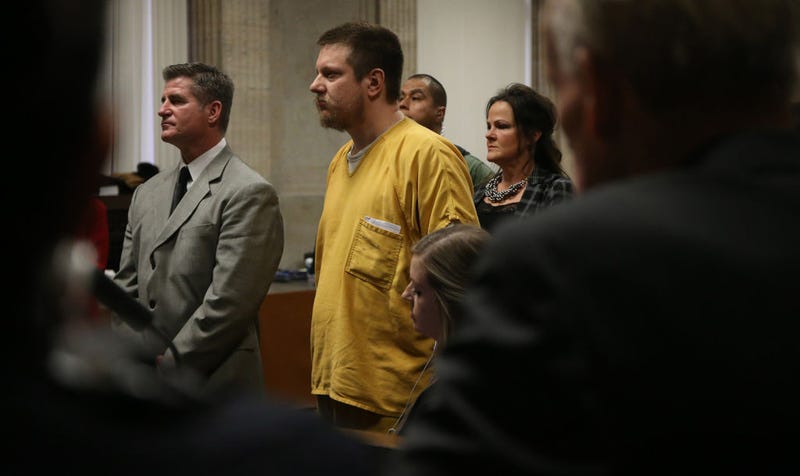
CHICAGO (WBBM NEWSRADIO) -- After serving about half of a less-than seven year prison sentence, the former Chicago police officer convicted of killing teenager Laquan McDonald in 2014 was released from prison Thursday. Activists and officials called his release a “disappointment” and pushed for new charges to be filed by federal prosecutors.
A spokesman for Governor JB Pritzker said Jason Van Dyke was freed Thursday morning. Van Dyke served three years and four months of his six-year, nine month prison sentence for gunning down 17-year-old Laquan McDonald, shooting the teen 16 times while on duty on the city’s Southwest Side.
His six-year, nine month prison sentence was handed down after his 2018 conviction for second-degree murder and 16 counts of aggravated battery — one for each bullet he fired at McDonald.
“This is the ultimate illustration that Black lives don’t matter as much as other lives,” said the Rev. Marshall Hatch, a prominent minister on the city’s West Side. “To get that short amount of time for a murder sends a bad message to the community.”
Prosecutors had originally sought an 18-year sentence.
Civil rights and community organizations said a Cook County judge gave Van Dyke a slap on the wrist for killing Laquan McDonald.
McDonald’s family and others have been pushing to have the U.S. Justice Department file federal civil rights charges against the former cop.
To Hatch and others, Van Dyke’s early release is another reminder of what they already knew.
“It just reinforces this feeling of hopelessness in African American communities, and reinforces the thought that police can continue their oppressive behavior in those communities and be either exonerated or given light sentences,” said Chico Tillmon, a senior research fellow at the University of Chicago Crime Lab and a former gang member.
“I served 16 years and 3 months for conspiracy to sell drugs and somebody who committed murder, openly, publicly, did 3 1/2 years,” he said. “This kind of thing happens over and over.”
Cook County State’s Attorney Kim Foxx responded to Van Dyke’s release by saying the sentence did “not meet the crime” and encouraging new charges on the federal level.
“If there’s an ability to do something about it on the federal level, then, by all means, something should be done,” Foxx said in a statement Thursday.
“I suggest, and hope and pray…that all those who have the power to make sure that there’s accountability for the death of Laquan McDonald, do everything in their power to hold him accountable,” said Foxx, whose office did not prosecute Van Dyke’s case.
Chicago Mayor Lor Lightfoot released a statement ahead of Van Dyke's release.
“I know some Chicagoans remain disheartened and angry about Jason Van Dyke’s sentence for the murder of Laquan McDonald. As I said at the time, while the jury reached the correct guilty verdict, the judge’s decision to sentence Van Dyke to only 81 months was and remains a supreme disappointment. I understand why this continues to feel like a miscarriage of justice, especially when many Black and brown men get sentenced to so much more prison time for having committed far lesser crimes. It’s these distortions in the criminal justice system, historically, that have made it so hard to build trust.
"While I know this moment is disappointing, it should not prevent us from seeing the significant progress Van Dyke’s prosecution and conviction represent. He was the first officer in more than half a century to be convicted of a crime committed purportedly in the line of duty. This prosecution led to historic reforms, including comprehensive legislation that created the first-ever community police oversight body in Chicago, and a consent decree to oversee CPD reform. There is much more work to do, and it is by doing that work that we can heal from this and move forward towards justice and accountability every day.”
Cook County Board President Toni Preckwinkle said, “We are again forced to reckon with this gross miscarriage of justice and the pervasive inequities built into our criminal justice system.
“While Van Dyke being convicted at all was a step in the right direction, his short sentence is at odds with the thousands of Black and Brown people behind bars for nonviolent offenses,” Preckwinkle said in a statement. “And in the years following Laquan’s murder, we have lost more young Black and Brown men at the hands of police. I pray for peace for the McDonald family today and remain resolved to creating a criminal justice system that is truly fair and just.”
Van Dyke, 43, dropped appeals of his conviction a year into his sentence because he wanted to serve out his time and avoid further attention.
Van Dyke, who was beaten by inmates at a federal prison in Danbury, Connecticut, early in his sentence, has spent much of his time behind bars since in solitary confinement and has been repeatedly transferred among prisons.
Activists plan to rally Thursday afternoon at Federal Plaza in Chicago to urge federal prosecutors to file additional charges.
Van Dyke will serve three years on supervised release, equivalent to parole, which will require occasional check-ins with a court officer. Wherever he lives in Illinois, he will also have to give information to his local police department for the state’s Violent Offender Against Youth Registry, which would typically make information such as his address available on a public database.
(WBBM Newsradio, the Sun-Times Media Wire and the Associated Press contributed to this copy.)



